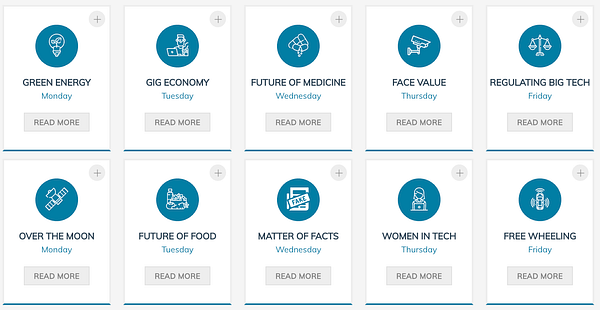|
Jean-Louis will be back next week
Deepnews.ai will now publish 15 in-depth newsletters powered by its proprietary algorithm. Here is how we selected the five new topics we are launching this week.
By Frederic Filloux

photos: UnsplashUnfortunately, we are not done with the COVID-19 pandemic. In the United States and some other countries, infection rates are picking up, albeit with less lethality. This is mostly due to the demographics of the newly infected: mostly young and therefore more resistant people. But with spreading infection they put the most vulnerable segment at a greater risk.
The current situation reflects the direst predictions: the virus is here to stay, the prospect of a V-shape recovery seems more remote than ever, the subsequent economic crisis will increase inequalities in most areas and will dramatically alter the way we live in many ways.
As a tech and media company, Deepnews.ai couldn’t ignore this long-term trend. Our initial roadmap was to broaden the sectors we cover with our proprietary technology: we “read” tens of thousands of articles each week to spotlight the best ones, in terms of editorial depth, diversity of sources, writing qualities. This is a long-term endeavor.
We originally intended to roll out about 30newsletters a year to cover an area that was wide but consistent with our focus on forward-looking topics, things bubbling up at the cutting edge of technology and tracking the evolution of the society. Hence our first two batches of newsletters:

(The full catalog is here)Of course, we intend to continue on that route. Over time, we will increase the number of sectors we follow, or we will further segment some we are already addressing (like mobility for instance). In the meantime, we will rework the underlying deep learning model that powers the platform (our current technology is described here). Our new chief technology officer Girish Gupta will most likely decide to break down our AI system with multiple layers of more specialized neural networks aimed at increasing the accuracy of the platform, creating different versions to process a wider range of topics in more nuanced ways, and eventually making our platform available in various languages (French is already underway).
To decide what topics to address, we probed our readers (both Deepnews.ai and the Monday Note). We translated the emerging trends of the survey into the following themes we are unveiling this week:

Economic Recovery will be published every Monday, in addition to Green Energy and Over the Moon (about the new space race). This newsletter is about the conditions of the post-COVID recovery, how fast, how sustainable it will be. At a macro and micro level, we will gather a global panorama of the new economic world unfolding.
Education will be published every Tuesday, in addition to Gig Economy and Future of Food. Most of the jobs that will be common ten years from now don’t even exist today. Life-long learning will be mandatory. Furthermore, online teaching might become the norm in most colleges and universities for the next academic year, impacting drastically the business model of higher education. Already, a large majority of students say they won’t pay full-tuition anymore. Numerous universities will simply go out of business as most institutions will engage in massive cost-cutting programs. At the same time, as nature abhors a vacuum, new opportunities will emerge for startups, with new tools, to provide lightweight forms of education with more actionable and adaptable forms of training.
Cities. Published on Wednesday along with Matter of Facts and Future of Medicine, this newsletter will address the morphing of metropolises in a pandemic-threatened world: the evolution of housing, the challenge of public transportation (how to counter the big comeback of the individual car), urban planning and new sustainable architecture. The ability of cities to recover from all sorts of crises (dotcom crash, financial meltdown, stock market hiccups), is no longer a certainty. With less than 3 percent of the US population, New York suffered nearly 20 percent of the US deaths related to the pandemic. In San Francisco, only a third of tech workers went back to work last month, while others intend to continue working from home indefinitely. This will alter the way cities are built and managed.
Travel. Published on Thursday, along with Women in Tech and Face Value (about facial recognition technologies). The pandemic has been brutal for the travel and hospitality industry, a sector that accounted for 10.4 percent of the total global GDP in 2019. Air travel won’t return to normal before 2023, experts say. Some research suggests that only a fraction of airlines will survive. Right now, carriers are struggling to devise efficient ways to create contamination-free travel. At the local level, eco-tourism is thriving. The more remote the location, the better. Our Travel newsletter will explore the change in the way we move and the socio-economic impact.
Gen-Z to Boomers. Published on Friday, along with Regulating Big Tech and Free Wheeling (about autonomous vehicles), this newsletter will explore the growing divides as well as the similarities between Generation Z, Millennials, and other age groups such as Baby Boomers and the Gen-X crowd. Gen-Z, born between 1996 and 2010, are the offsprings of the great recession, the rise of social networks, the refugee crisis, the rise of populism, climate change, and of course the pandemic of 2020. They are a particular focus as they are just starting to decide what their impact on the world will be, as are Millennials who may be particularly impacted by the economic fallout of COVID. However, the entire focus isn’t on the young, and this newsletter, as often as possible based on hard statistics and evidence rather than inter-generational conjecture, pulls in pieces that explore what all the generational identities mean, or if they mean as much as we think.
This third batch of newsletters was also chosen to spotlight sources from the long tail: the blogs, the small websites, written by specialists who do not necessarily produce very often and are not affiliated with a particular media outlet. This is actually one of the most difficult parts of our work, though something that makes the type of service we offer different and one of the parts we most enjoy. It requires a great deal of research and careful vetting of the source. To suggest a publication, please contact our editorial team lead by Christopher Brennan at [hidden email].
— [hidden email]
Please give us your feedback about the Monday Note

The Monday Note is almost 13 years old and we are going to give it a refresh. As a first step, we would like to get your opinion about our work. Please take a moment to complete this short survey. This matters a lot to us.Thanks!
— Frederic

Unsubscribe instantly from these emails by clicking here.
[]
|









